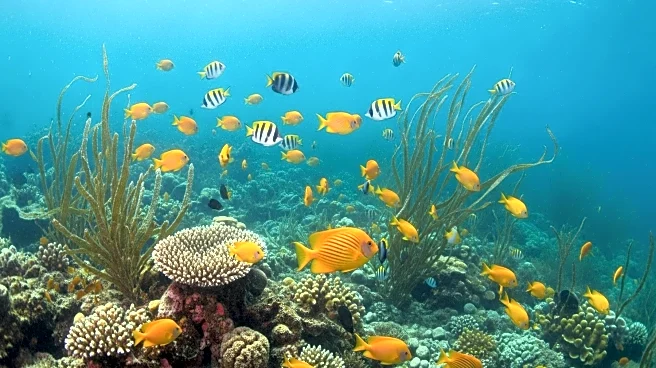What's Happening?
The World Trade Organization (WTO) has implemented a landmark agreement aimed at curbing harmful fisheries subsidies, marking a significant step in global efforts to protect marine ecosystems. The agreement, known as Fish 1, targets subsidies that contribute to illegal, unreported, and unregulated fishing, as well as overfished stocks and unregulated high seas fisheries. This development follows years of negotiations and is now legally binding for two-thirds of WTO member countries. The agreement is part of the UN's Sustainable Development Goals, specifically Goal 14, which seeks to end harmful fisheries subsidies. The WTO is also negotiating a second set of rules, referred to as Fish 2, which aims to address subsidies that lead to overcapacity and overfishing. These negotiations have faced delays, but the upcoming WTO Ministerial Conference could provide fresh momentum.
Why It's Important?
The implementation of the WTO agreement is crucial for the recovery of global fish populations, which have been severely impacted by subsidy-driven overfishing. By reducing harmful subsidies, the agreement aims to protect the livelihoods of coastal communities that rely on healthy oceans. The agreement also sets a precedent for future multilateral treaties focused on environmental sustainability. For countries like China, the agreement enhances transparency in subsidy policies, potentially leading to more responsible fisheries management. The agreement's success could influence broader fisheries reform at regional and national levels, promoting sustainable practices and protecting marine biodiversity.
What's Next?
WTO members must now focus on implementing the Fish 1 rules, which require ending subsidies for harmful fishing practices and increasing transparency in subsidy programs. The Fish Fund has been established to support developing countries in monitoring and compliance efforts. The WTO's upcoming Ministerial Conference could play a critical role in advancing negotiations for the Fish 2 package, which aims to further reduce capacity-enhancing subsidies. Strong leadership from major economies and coalitions will be essential to maintain momentum and achieve meaningful reform. The agreement's four-year sunset clause adds urgency to these efforts.
Beyond the Headlines
The WTO agreement offers a unique opportunity for regions like Latin America to improve ocean governance and manage marine resources responsibly. By redirecting financial resources towards sustainable fishing practices, countries can enhance food security and economic resilience for vulnerable coastal communities. The agreement also encourages global discussions on defining overfishing and determining appropriate recipients of subsidies, which could lead to more equitable and effective fisheries management.









